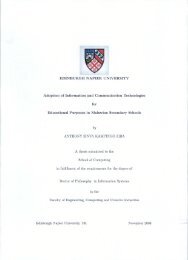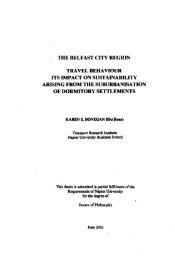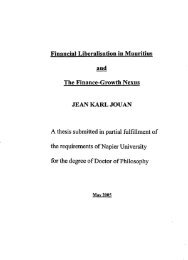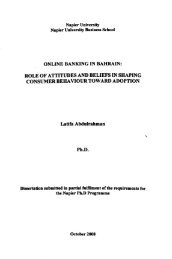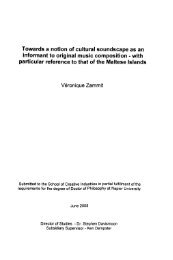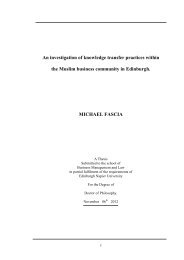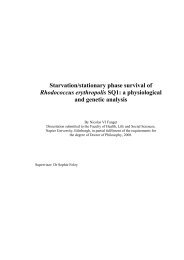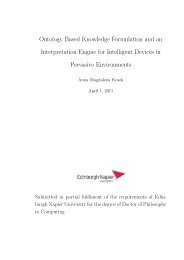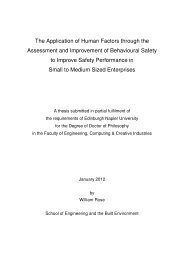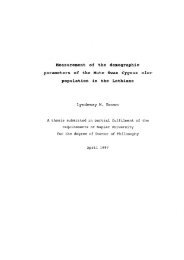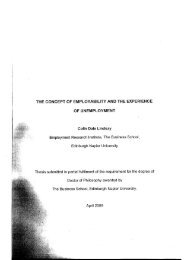The Role of Niche Tourism Products in Destination - Repository ...
The Role of Niche Tourism Products in Destination - Repository ...
The Role of Niche Tourism Products in Destination - Repository ...
Create successful ePaper yourself
Turn your PDF publications into a flip-book with our unique Google optimized e-Paper software.
Baert, when analys<strong>in</strong>g the development <strong>of</strong> pragmatist theory, notes how there is ‘not a pragmatist party l<strong>in</strong>e that all have to toe’<br />
(Baert, 2005, p.129), but there are a number <strong>of</strong> key ideological stances that are commonly shared. <strong>The</strong>se <strong>in</strong>clude the view <strong>of</strong> the<br />
active acquisition <strong>of</strong> knowledge as a way <strong>of</strong> cop<strong>in</strong>g with life’s demands;<br />
the use <strong>of</strong> a conceptual system; the recognition that human <strong>in</strong>quiry need not imply the subjectivity <strong>of</strong> people’s knowledge and the<br />
settl<strong>in</strong>g <strong>of</strong> theoretical disputes by determ<strong>in</strong><strong>in</strong>g what effects they have. Seale et al. also report that ‘the real is never abandoned by<br />
the pragmatist, but rather sensibly put to the test <strong>of</strong> everyday life’ (Seale et al. 2004, p.4).<strong>The</strong>refore the ontological position <strong>of</strong><br />
pragmatists is that the ‘mandate <strong>of</strong> science is not to f<strong>in</strong>d truth or reality, the existence <strong>of</strong> which are perpetually <strong>in</strong> dispute, but to<br />
facilitate human problem-solv<strong>in</strong>g’ (Powell, 2001, p.884). <strong>The</strong> pragmatist explanation <strong>of</strong> reality is closer to the researcher’s values.<br />
As Tashakkori and Teddlie (1998) state, <strong>in</strong>stead <strong>of</strong> search<strong>in</strong>g for truth, pragmatists consider truth to be ‘what works’. <strong>The</strong>y cont<strong>in</strong>ue<br />
that the pragmatist po<strong>in</strong>t <strong>of</strong> view rejects the forced choice between positivism and <strong>in</strong>terpretivism choos<strong>in</strong>g to use ‘the dazzl<strong>in</strong>g array<br />
<strong>of</strong> both qualitative and quantitative methods’ (Tashakkori and Teddlie, 1998, p. 24) dependent upon the research question and the<br />
phase <strong>of</strong> the research project. It is this pr<strong>in</strong>ciple that has heavily <strong>in</strong>fluenced the approach that I have taken <strong>in</strong> the field <strong>of</strong> tourism<br />
enquiry. My research is framed not only <strong>in</strong> the belief <strong>of</strong> the existence <strong>of</strong> the ‘real’, which disconnects knowledge from everyday life,<br />
but also <strong>in</strong> the belief <strong>in</strong> collaborative knowledge production with <strong>in</strong>dustry partners and other key researchers <strong>in</strong> the field.<br />
<strong>The</strong> epistemological positions <strong>of</strong> pragmatists are that <strong>of</strong> ‘belief’, ‘doubt’ and ‘habit’ (Pansiri, 2005, p.197). For pragmatists, therefore,<br />
both knowledge and social reality are based on beliefs and habits which are socially constructed. Berger and Luckmann (1967)<br />
argue that knowledge is historical and l<strong>in</strong>ked to legitimation, <strong>in</strong>stitutionalization and socialisation. <strong>The</strong> epistemological position <strong>of</strong> my<br />
research <strong>in</strong>volves the use <strong>of</strong> the most appropriate approach to develop<strong>in</strong>g knowledge with a focus on <strong>in</strong>teraction with the subjects



